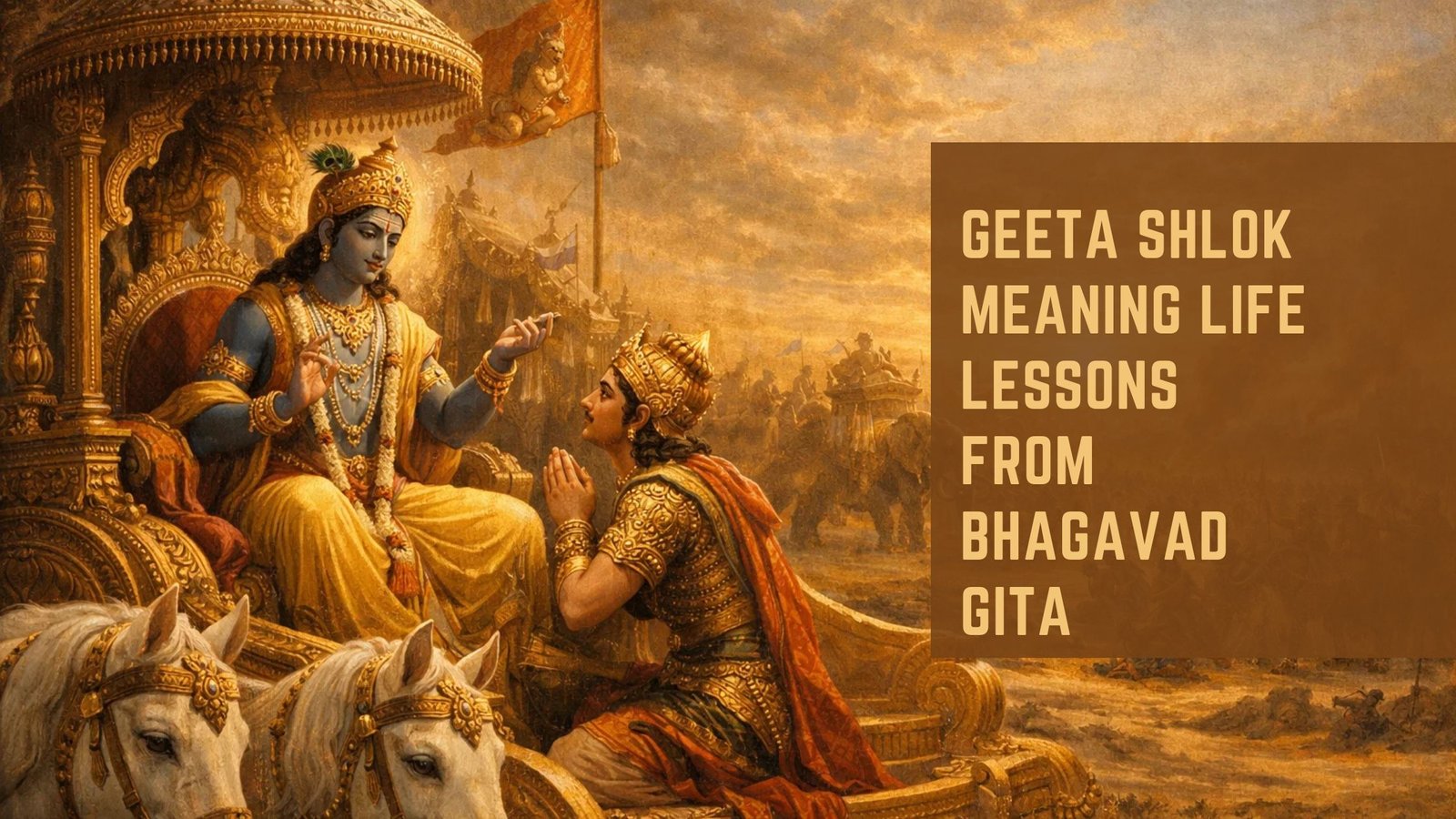The Bhagavad Gita, a revered text in Hindu philosophy, serves as a spiritual guide that addresses the complexities of life and the pursuit of righteousness. Among its many teachings, Chapter 12, Verse 8 stands out as a profound directive for those seeking inner tranquility. This verse encapsulates the essence of surrendering to the divine will, emphasizing the importance of devotion and unwavering faith.
In a world often fraught with chaos and uncertainty, the wisdom contained within this verse offers a pathway to peace that resonates with individuals across cultures and beliefs. In this verse, Lord Krishna articulates a simple yet powerful message: to find peace, one must focus their mind on Him, surrender their ego, and cultivate a sense of devotion. This call to action is not merely a religious exhortation but a universal principle that can be applied to various aspects of life.
By understanding and internalizing the teachings of Bhagavad Gita 12.8, individuals can embark on a transformative journey toward achieving lasting peace amidst the tumult of everyday existence.
Key Takeaways
- Bhagavad Gita 12.8 introduces the concept of finding peace through devotion to the Supreme Being.
- Understanding the concept of finding peace involves surrendering one’s ego and desires to the Supreme Being.
- Bhagavad Gita 12.8 is significant in finding peace as it emphasizes the importance of unwavering devotion and trust in the Supreme Being.
- Practically applying Bhagavad Gita 12.8 in daily life involves cultivating a sense of surrender and trust in the Supreme Being in all actions.
- Overcoming obstacles in finding peace requires developing a strong sense of faith and devotion to the Supreme Being.
- Self-discipline plays a crucial role in finding peace as it helps in controlling the mind and focusing on the Supreme Being.
- Cultivating inner peace through Bhagavad Gita 12.8 involves practicing devotion, self-discipline, and surrender to the Supreme Being.
- Embracing peace through Bhagavad Gita 12.8 requires integrating the teachings into daily life and maintaining a strong connection with the Supreme Being.
Finding peace is often perceived as an elusive goal, one that many strive for yet few attain. It encompasses a state of mental and emotional calmness, free from the disturbances that life inevitably brings. Peace is not merely the absence of conflict; rather, it is a profound sense of contentment and harmony within oneself.
This inner tranquility allows individuals to navigate life’s challenges with grace and resilience, fostering a deeper connection with themselves and the world around them. The quest for peace can take many forms, from meditation and mindfulness practices to philosophical inquiry and spiritual exploration. Each individual’s journey is unique, shaped by personal experiences, beliefs, and aspirations.
However, at its core, the pursuit of peace involves a conscious effort to cultivate a mindset that prioritizes serenity over chaos. It requires individuals to confront their fears, let go of attachments, and embrace the present moment with an open heart. In this context, the teachings of the Bhagavad Gita provide invaluable insights into how one can achieve this state of being.
Bhagavad Gita 12.8 serves as a beacon of hope for those seeking solace in a tumultuous world. The verse emphasizes the importance of surrendering one’s mind and heart to the divine, suggesting that true peace can only be attained through devotion and trust in a higher power. This act of surrender is not a sign of weakness; rather, it is an acknowledgment of the limitations of human understanding and control.
By relinquishing the need to dictate every aspect of life, individuals open themselves up to a greater sense of purpose and fulfillment. Moreover, this verse highlights the transformative power of faith. When individuals commit themselves to a path of devotion, they often find that their worries and anxieties diminish.
The act of focusing one’s thoughts on the divine fosters a sense of connection that transcends the mundane struggles of daily life. In this way, Bhagavad Gita 12.
Integrating the teachings of Bhagavad Gita 12.8 into daily life requires intentionality and practice. One effective approach is to establish a daily routine that includes moments of reflection and meditation focused on surrendering to the divine will. This could involve setting aside time each morning or evening to engage in prayer or meditation, allowing individuals to center their thoughts and cultivate a sense of devotion.
By consistently redirecting their focus toward the divine, individuals can gradually train their minds to remain anchored in peace amidst external distractions. Additionally, applying the principles of Bhagavad Gita 12.8 can manifest in how individuals approach challenges and conflicts in their lives. Instead of reacting impulsively or allowing stress to dictate their responses, they can practice mindfulness by pausing to reflect on their thoughts and emotions.
This conscious awareness enables them to respond with compassion and understanding rather than frustration or anger. By embodying the teachings of this verse in their interactions with others, individuals can create an environment conducive to peace not only for themselves but also for those around them.
Overcoming obstacles in finding peace
The journey toward finding peace is often fraught with obstacles that can hinder progress. These challenges may include external factors such as stressful work environments or personal relationships fraught with tension. Additionally, internal struggles such as self-doubt, fear, and negative thought patterns can create significant barriers to achieving inner tranquility.
Recognizing these obstacles is the first step toward overcoming them; awareness allows individuals to confront their fears rather than avoid them. To navigate these challenges effectively, individuals can draw upon the teachings of Bhagavad Gita 12.8 as a source of strength and guidance. By cultivating a mindset rooted in surrender and devotion, they can learn to view obstacles as opportunities for growth rather than insurmountable barriers.
This shift in perspective empowers individuals to approach difficulties with resilience and grace, fostering an inner sense of peace even in the face of adversity.
The role of self-discipline in finding peace

Self-discipline plays a crucial role in the pursuit of peace as it enables individuals to cultivate habits that support their spiritual growth and emotional well-being. The teachings of Bhagavad Gita 12.8 emphasize the importance of focusing one’s mind on the divine; however, achieving this focus requires consistent effort and dedication. Developing self-discipline involves creating routines that prioritize spiritual practices such as meditation, prayer, or study of sacred texts.
Moreover, self-discipline extends beyond formal practices; it encompasses how individuals manage their thoughts and emotions throughout the day. By consciously choosing to redirect negative thoughts toward positive affirmations or engaging in acts of kindness, individuals can reinforce their commitment to finding peace. This disciplined approach fosters an environment where inner tranquility can flourish, allowing individuals to experience the profound benefits outlined in Bhagavad Gita 12.8.
Cultivating inner peace through Bhagavad Gita 12.8 involves embracing its teachings as guiding principles for daily living. The act of surrendering one’s mind and heart to the divine encourages individuals to let go of attachments and expectations that often lead to suffering. By practicing detachment from outcomes and trusting in a higher plan, individuals can experience a profound sense of liberation from anxiety and stress.
Furthermore, engaging with the teachings of Bhagavad Gita 12.8 fosters a deeper understanding of one’s true nature beyond societal roles and identities. This realization allows individuals to connect with their authentic selves, leading to greater self-acceptance and compassion for others. As they cultivate this inner peace, they become beacons of tranquility in their communities, inspiring others to embark on their own journeys toward serenity.
In conclusion, Bhagavad Gita 12.8 offers timeless wisdom for those seeking peace amidst life’s challenges. Its teachings encourage individuals to surrender their minds and hearts to the divine while cultivating devotion and trust in a higher power. By understanding and applying these principles in daily life, individuals can navigate obstacles with resilience and grace while fostering an environment conducive to inner tranquility.
As they embrace the teachings of Bhagavad Gita 12.8, individuals embark on a transformative journey toward self-discovery and spiritual growth. Ultimately, embracing peace through Bhagavad Gita 12.8 is not just an individual pursuit; it is a collective endeavor that has the potential to create ripples of harmony throughout society, inspiring others to seek their own paths toward serenity. In a related article to Bhagavad Gita Chapter 12 Verse 8, “He who is the same to friend and foe,” the importance of teaching kids the wisdom of the Gita for young minds is highlighted.
This article discusses how introducing children to the timeless wisdom of the Bhagavad Gita can help shape their understanding of relationships and values from a young age. To read more about this topic, visit Teach Kids the Gita: Wisdom for Young Minds.
FAQs
What is the significance of Bhagavad Gita chapter 12 verse 8?
Bhagavad Gita chapter 12 verse 8 emphasizes the importance of devotion and surrender to God. It highlights the idea that those who dedicate themselves to the supreme divine with unwavering faith and love are dear to God.
What does Bhagavad Gita chapter 12 verse 8 teach?
This verse teaches the value of surrendering to God with complete devotion and faith. It emphasizes the idea that true devotion and love for the divine are the most cherished qualities in the eyes of God.
How does Bhagavad Gita chapter 12 verse 8 relate to the broader teachings of the Bhagavad Gita?
The verse aligns with the broader teachings of the Bhagavad Gita, which emphasize the importance of selfless devotion, righteousness, and the path to spiritual enlightenment. It reinforces the idea that devotion and surrender to God are essential for spiritual growth and liberation.














